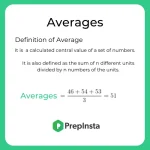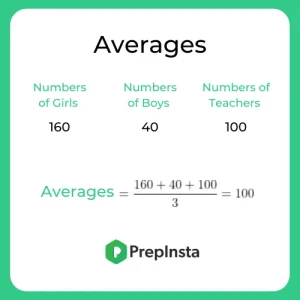Quants Menu
- HCF and LCM
- Number System
- Number Decimals & Fractions
- Surds and Indices
- Divisibility
- Ages
- LCM
- HCF
- Inverse
- Speed Time and Distance
- Work and Time
- Boats and Streams
- Pipes and Cisterns
- Averages
- Allegations and Mixtures
- Ratio and Proportions
- Simple & Compound Interest
- Simple Interest
- Compound Interest
- Percentages
- Profit & Loss
- Successive Discount 1
- Successive Discount 2
- AP GP HP
- Arithmetic Progressions
- Geometric Progressions
- Harmonic Progressions
- Probability
- Permutation & Combination
- Combination
- Circular Permutation
- Geometry
- Heights and Distances
- Perimeter Area and Volume
- Coordinate Geometry
- Venn Diagrams
- Set Theory
- Algebra
- Linear Equations
- Quadratic Equations
- Logarithms
- Clocks
- Calendars
- Clocks and Calendars
- Finding remainder of large powers
PREPINSTA PRIME
Averages Formulas
Averages Formulas Used In Aptitude
Averages formulas is widely used in statistics also to reduce the calculation in finding the average where the data is huge. Here We will demonstrate the application of the assumed mean to solve some aptitude questions based on averages and weighted averages.

In this Page Averages Formulas are given which is useful to solve many problems
- An average is defined as the sum of n different units divided by n numbers of the units.
Example:- What will be the average weight of three boy, respective weight are 46,54,53?
Solution: \frac{\text{sum of numbers}}{\text{total numbers}}
=\frac{(46+54+53 )}{3}
=\frac{153}{3}
=51

Example:- A school trip by St Marry’s Academy, Meerut was organized to Appu Ghar Delhi. The total number of Girls on the trip were 160, total number of boys on the trip were 40 and total number of teachers present on the trip were 100. If they want to ride a roller coaster and all of them can not board the ride at one time. Find the average no. people boarding the ride.
Solution: \frac{\text{sum of numbers}}{\text{total numbers}}
= \frac{(160+40+100)}{3}
= 100

Prime Course Trailer
Related Banners
Get PrepInsta Prime & get Access to all 200+ courses offered by PrepInsta in One Subscription
Basic Averages Formulas:
- Mathematically, it is defined as the ratio of summation of all the numbers to the number of units present in the list.
Average = \mathbf{\frac{X_{1}+X_{2}+X_{3}+X_{4}+…..X_{n}}{n}}
OR
Average = \frac{\text{Sum of Observations}}{\text{Total Number of Observations}}
Average Speed and Velocity Formula:
- Average Speed : It can be defined as total distance Travelled by a body in definite interval of time. Average speed is calculated using the below formula
Average Speed = \mathbf{\frac{\text{Total Distance}}{\text{Total Time}}}
CASE 1:
When one travels at speed ‘a’ for half the time and speed ‘b’ for other half of the time. Then, average speed is the arithmetic mean of the two speeds.
Average Speed= \mathbf{\frac{a+b}{2}}
CASE 2 :
When one travels at speed ‘a’ for half of the distance and speed ‘b’ for other half of the distance.Then, average speed is the harmonic mean of the two speeds.
Average Speed= \mathbf {\frac{2ab}{a+b} }
CASE 3:
When one travels at speed a for one-third of the distance, at speed b for another one-third of the distance and speed c for rest of the one-third of the distance
or:
Average Speed = \mathbf{\frac{3abc}{ab+bc+ca}}
Average Velocity : It can be defined as total displacement divided by total time. We calculate Average Velocity using the below formula
Average Velocity = \mathbf{\frac{Displacement}{Total Time}}
Formula of Averages Related to Numbers:
- Average of ‘n’ consecutive Natural Numbers =
\mathbf{\frac{n+1}{2}} - Average of the square of consecutive n natural numbers =
\mathbf{\frac{(n+1)(2n+1)}{6}} - Average of cubes of consecutive n natural numbers =
\mathbf{\frac{n\times (n+1)^{2}}{4}} - Average of n consecutive even numbers = (n+1)
- Average of consecutive even numbers till n =
\mathbf{\frac{n}{2}+1} - Average of n consecutive odd numbers = n
- Average of consecutive odd numbers till n =
\mathbf{\frac{n+1}{2}} - Sum of 1st n even consecutive natural numbers is = n(n + 1)
- Sum of 1st n odd consecutive natural numbers is = \mathbf{n^{2}}
Question 1 :
The average of 10 numbers is 23. If each number is increased by 4, what will the new average be?
Solution :
Average of 10 numbers = 23
Sum/Total numbers = 23
Sum/10 = 23
Sum of the 10 numbers = 230
If each number is increased by 4, the total increase = 4 x 10 = 40
New sum = 230 + 40 = 270
Therefore, the new average = 270/10 = 27
Question 2 :
The average weight of a group of seven boys is 56 kg. The individual weights (in kg) of six of them are 52, 57, 55, 60, 59 and 55. Find the weight of the seventh boy.
Solution :
Average weight of 7 boys = 56 kg.
Total weight of 7 boys = (56 × 7) kg = 392 kg.
Total weight of 6 boys = (52 + 57 + 55 + 60 + 59 + 55) kg
= 338 kg.
Weight of the 7th boy = (total weight of 7 boys) – (total weight of 6 boys)
= (392 – 338) kg
= 54 kg.
Therefore, the weight of the seventh boy is 54 kg.
Question 3:
The mean of 25 numbers is 36. If the mean of the first numbers is 32 and that of the last 13 numbers is 39, find the 13th number.
Solution :
Mean of the first 13 numbers = 32
Sum of the first 13 numbers = (32 × 13) = 416
Mean of the last 13 numbers = 39
Sum of the last 13 numbers = (39 × 13) = 507
Mean of 25 numbers = 36
Sum of all the 25 numbers = (36 × 25) = 900
Therefore, the 13th observation = (416 + 507 – 900) = 23
Hence, the 13th observation is 23
Question 4 :
The average of 7 consecutive numbers is 20. What is the largest of these numbers?
Solution :
Let the 7 consecutive numbers be x, x + 1, x + 2, x + 3, x + 4, x + 5 and x + 6,
As per the given condition;
[x + (x + 1) + (x + 2) + (x + 3) + (x + 4) + (x + 5) + (x + 6)] / 7 = 20
⇒ 7x + 21 = 140
⇒ 7x = 119
⇒ x =17
The largest number = x + 6 = 23.
Question 5 :
A batsman makes a score of 87 runs in the 17th inning and thus increases his average by 3. Find his average after 17th inning?
Solution :
Let the average after 7th inning = x
Then average after 16th inning = x – 3
16(x-3)+87 = 17x
x = 87 – 48 = 39
Also Check Out
Get over 200+ course One Subscription
Courses like AI/ML, Cloud Computing, Ethical Hacking, C, C++, Java, Python, DSA (All Languages), Competitive Coding (All Languages), TCS, Infosys, Wipro, Amazon, DBMS, SQL and others
- Allegations and Mixtures – Questions | Formulas | How to Solve Quickly | Tricks & Shortcuts
- Ratio and Proportions – Questions | Formulas | How to Solve Quickly | Tricks & Shortcuts
- Simple & Compound Interest – Questions | Formulas | How to Solve Quickly | Tricks & Shortcuts
- Simple Interest – Questions | Formulas | How to Solve Quickly | Tricks & Shortcuts
- Compound Interest – Questions | Formulas | How to Solve Quickly | Tricks & Shortcuts
- Percentages – Questions | Formulas | How to Solve Quickly | Tricks & Shortcuts
- Profit & Loss – Questions | Formulas | How to Solve Quickly | Tricks & Shortcuts
Others
- Allegations and Mixtures – Questions |
Formulas |
How to Solve Quickly |
Tricks & Shortcuts - Ratio and Proportions – Questions |
Formulas |
How to Solve Quickly |
Tricks & Shortcuts - Simple & Compound Interest – Questions |
Formulas |
How to Solve Quickly |
Tricks & Shortcuts - Simple Interest – Questions |
Formulas |
How to Solve Quickly |
Tricks & Shortcuts - Compound Interest – Questions |
Formulas |
How to Solve Quickly |
Tricks & Shortcuts - Percentages – Questions |
Formulas |
How to Solve Quickly |
Tricks & Shortcuts - Profit & Loss – Questions |
Formulas |
How to Solve Quickly |
Tricks & Shortcuts
Others
Get over 200+ course One Subscription
Courses like AI/ML, Cloud Computing, Ethical Hacking, C, C++, Java, Python, DSA (All Languages), Competitive Coding (All Languages), TCS, Infosys, Wipro, Amazon, DBMS, SQL and others

 Apply For Jobs
Apply For Jobs Get Hiring Updates
Get Hiring Updates




Login/Signup to comment